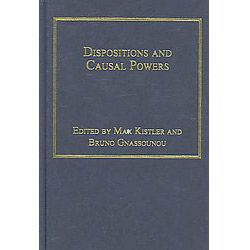
28 Jan Dispositions and Causal Powers
Dispositions are everywhere. We say that a wall is hard, that water quenches thirst and is transparent, that dogs can swim and oak trees can let their leaves fall, and that acid has the power to corrode metals. All these statements express attributions of dispositions, be they physical, physiological or psychological, yet there is much philosophical debate about how far, if at all, dispositional predicates can have complete meaning or figure in causal explanations.
This collection of essays, by leading international researchers, examine the case for realism with respect to dispositions and causal powers in both metaphysics and science. Among the issues debated in this book is whether dispositions can be analyzed in terms of conditionals, whether all dispositions have a so-called categorical basis and, if they do, what is the relation between the disposition and its basis.
Contents: Introduction, Bruno Gnassounou and Max Kistler.
Part 1 The Metaphysics of Dispositions and Causal Powers:
- Dispositions and counterfactuals. From Carnap to Goodman’s children and grandchildren, François Schmitz;
- Filled in space, Stephen Mumford;
- Dispositions and essences, Claudine Tiercelin;
- The causal efficacy of macroscopic dispositional properties, Max Kistler;
- Opium’s virtus dormitiva, Cyrille Michon;
- Conditional possibility, Bruno Gnassounou;
- On ascribing dispositions, Ludger Jansen.
Part 2 Dispositions and Causal Powers in Science:
- An extended semantic field of dispositions and the grounding role of causal powers, Rom Harré;
- What makes a capacity a disposition?, Nancy Cartwright;
- Causation, laws and dispositions, Andreas Hüttemann;
- Can capacities rescue us from Ceteris Paribus laws?, Markus Schrenk;
- Dispositions, relational properties and the quantum world, Mauro Dorato;
- Are specific heats dispositions?, Anouk Barberousse;
Bibliography;
Index.
Relié: 303 pages
Editeur : Ashgate (28 janvier 2007)
Langue : Anglais
ISBN-10: 0754654257
ISBN-13: 978-0754654254
Voir en ligne : Review by Jennifer McKitrick, University of Nebraska, Lincoln on Notre Dame Philosophical Reviews.
